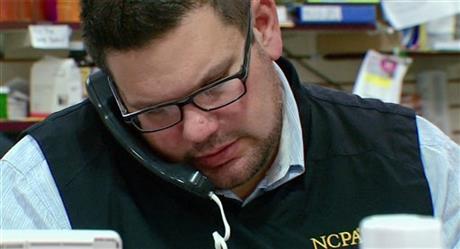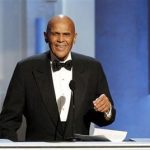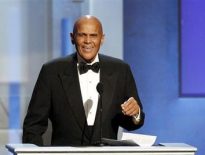WASHINGTON (AP) — Ever suspect you do more housework than your spouse? Or that certain tasks at work raise your blood pressure? Maybe you wonder why you’re sneezing more lately, or if carbs are really what is making you tired after lunch?

Turns out, there’s an app or gadget to test all of that. Advancements in wearable body sensors, mobile applications and other gadgets mean that nearly everything we do can be captured, logged and analyzed. And everyday consumers are jumping at the chance to conduct their own experiments — tracking sleep, caffeine intake, kids’ studying habits, household chores, even whether a baby is nursing more frequently on Mom’s left breast versus her right.
“I don’t know if I’d use the word ‘obsessed,'” said Ernesto Ramirez, a self-tracking devotee who helped to organize a two-day conference on the subject last week in San Francisco. Speakers at past “Quantified Self” conferences have included a man who developed his own app to see if he could walk every street in Manhattan and a dad who used trackers on his kids to monitor chores.
“I think there’s an overall trend toward curiosity and proving knowledge of one’s self in the world,” Ramirez said.
When Tim Davis of Beaver, Pa., tipped the scales at 318 pounds two years ago, he bought a Fitbit gadget to track his physical activity and the Lose It! app on his phone to track calories. He bought a Wi-Fi-enabled scale that published his daily weight on his Twitter feed and turned to other apps to track his pulse, blood pressure, daily moods and medications. At one point, Davis said he was using 15 different apps and gadgets, which he said helped him drop 64 pounds by that following year.
“It’s the second-by-second, minute-by-minute changes that really did it,” said Davis, 39. “If you’re the type of person who likes gadgets and devices and to collect metrics, you’re also the kind of person who does not like gaps in data.”
A pediatrician in Kansas City, Mo., Natasha Bugert, said apps that track newborn feedings and sleep patterns have become wildly popular among her patients and she now encourages parents to send her the data before their appointments.
“In the first few weeks, parents are so tired. It’s really hard for them to give you objective data,” Bugert said.
Public health advocates and researchers say tracking technology could be used to encourage people to use less gasoline, conserve water or drive slower by giving them real-time feedback on their daily habits. It also could expose causes of medical conditions that baffle doctors.
HopeLab, based in Redwood, Calif., is one nonprofit looking to harness technology to improve health. It has developed a $30 movement-tracking device for kids called a “Zamzee,” and a website that rewards activity with online points and badges.
HopeLab has developed video games for young cancer patients that lets them pretend to blast cancer cells. Researchers there say their studies have shown that the game improved patients’ moods and encouraged them to stick with treatment.
“When you give people a sense of autonomy, a sense of agency, that can actually be very transformative to their health,” said HopeLab spokesman Richard Tate.
Ramirez said he thinks the next step will be embedding sensors in nearly everything a person encounters throughout the day and linking that information together. Think of a car that won’t start if you’ve consumed too much alcohol or a light bulb that changes colors when it’s time to go to bed.
Industry watchers say these kinds of data-driven apps are finding their place in a market that has struggled to profit from advertising.
Raj Aggarwal, CEO of Localytics, a Boston-based analytics firm, says mobile games are still by far the most popular among consumers, but their fan base can be fickle. If a data-logging app is useful enough, it can convince consumers that they should pay for upgraded subscriptions or premium services that earn the developers money.
One mobile app called “GymPact” has found a novel way of making money off its consumers’ data. The app lets people bet against one another as to whether they will go to the gym. The non-exercisers have to pay the exercisers, with GymPact taking a cut.
But what becomes of all this data?
In theory, most apps let you delete your information. But programs such as the FitBit reserve the right to keep and analyze your information, and possibly pass along the data to third parties to make sure the program works as promised. What would happen if these tech companies decide to package and sell all that data? Could a person ever be denied a job or life insurance, for example, if their mobile app showed they tried but never quit smoking?
Poorly encrypted data or lax privacy controls could become a problem, too.
In 2011, some FitBit users were surprised to see their sexual activity logs pop up in Google searches; that’s something FitBit’s privacy settings allowed at the time unless a person knew to opt out. FitBit has since modified its policy to keep hidden more sensitive data unless someone configures his or her account specifically to share it.
As for Davis and his fight to lose weight, he said his biggest mistake was letting his FitBit gadget lose its charge last year. Without the continual feedback, and perhaps a mobile app to remind him, Davis’ motivation waned and his weight climbed to 292 pounds.
But Davis insists he won’t stay that way for long. He has persuaded his family members and coworkers to wear self-measuring devices, sparking a friendly rivalry.
“Keep an eye on me,” he said of the months ahead. “I think you’ll see a difference.”
___
Follow Anne Flaherty on Twitter at https://twitter.com/AnneKFlaherty





